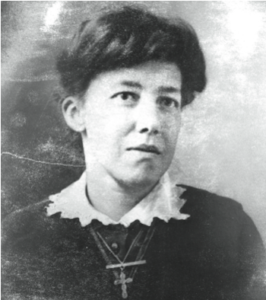
Geraldine P. Trotter
*Geraldine Trotter was born on this date in 1872. She was a Black publisher, editor, writer, and activist.
From Everett, MA., Geraldine Pindell was the daughter of Charles Edward Pindell and Mary Francis Pindell. Pindell received her initial education at the Everett Grammar School, then enrolled in a local business college. For ten years after completing her studies, Pindell Trotter worked as an accountant for the Eli Cooley Company. During this time, Pindell Trotter met W. E. B DuBois, and the two kept in touch for years after he finished his studies at Harvard. Dubois later recalled his desire to have courted her and lamented his inability. Having known William Monroe Trotter since childhood, Pindell Trotter married him after graduating from Harvard.
Both individuals' families were supportive, and aside from the fact that the Pindells were Northern in origin and the Trotters Southern, there was no contention between each. Following marriage, the young pair moved into the middle-class Dorchester area of Boston at 97 Sawyer Avenue. Monroe Trotter shortly entered the real estate business, working with mostly white clients. As Monroe Trotter's real estate venture increasingly garnered success, Pindell Trotter stopped working.
Entertaining elite guests occupied much of Pindell Trotter's time after that. Notable individuals Pindell Trotter entertained included DuBois and his family and the lawyer Archibald Grimke and his family. The Trotters remained childless throughout their marriage, and Pindell Trotter told friends she had no desire to have children, as their busy lives would not allow for proper care. Pindell Trotter often aided the City of Boston and surrounding areas throughout her life.
In Roxbury, Pindell Trotter imparted her skills to a local community aid center, St. Monica's Home. A bastion for African American women and children needing care, St. Monica's in Dorchester was episcopalian, mirroring Pindell Trotter's religion. Pindell Trotter was also involved in the Public School Association, the Boston Literary and Historical Society, the Women's Anti-Lynching League, and the Equal Rights Association. Pindell Trotter dedicated herself to the welfare of African American soldiers in World War I and the Soldiers Comfort Units, notably aiding the 519th engineers at Fort Devens. Pindell Trotter, with her husband William, also demonstrated against a second run showing of The Birth of a Nation.
Monroe Trotter quickly became involved when George W. Forbes created The Boston Guardian in 1901. In the wake of the Boston Riot of 1903, at which Monroe Trotter was arrested, Pindell Trotter rushed to the paper's aid as an editor in her husband's place and assumed bookkeeping duties. With Monroe Trotter recurrently in jail for his activities and Forbes gone, Pindell Trotter assumed most of the paper's required duties and became a key aspect of the future direction of the paper. Pindell Trotter also wrote columns on fashion and household management, attempting to attract female readership at her husband's behest.
The Guardian, under the direction of the Trotters, often disparaged Booker T. Washington's eminence in the public domain. Washington's ideation of working for equality without pressing for it directly opposed Trotter's philosophy. Washington worked tirelessly against the newspaper's agenda, including militant civil rights promotion and other rights causes. Dubois asked the Trotters to join the recently founded NAACP. However, the Trotters refused over objection to the organization's white leadership.
She raised money for St. Monica’s Home and advocated for Black troops during World War I. Geraldine Pindell Trotter died on October 8, 1918, due to influenza. Pindell Trotter was only forty-six at the time of her passing. She was buried in the Fairview Cemetery of Hyde Park. After her death, The Guardian included a tribute to her from her husband: he called her his “fallen Comrade” who gave her life “for the rights of her race.” W.E.B Dubois reminisced sadly in his autobiography that she "had given up all thought of children" and that she had forfeited her "comfortable home" to help her husband, "in utter devotion, living and lunching with him in the Guardian office, and knowing hunger and cold."
Dubois said their ended union was "a magnificent partnership, and she died to pay for it." The Trotter's first home in Dorchester, the William Monroe Trotter House, was designated a National Historic Landmark to recognize their significance in the civil rights cause.